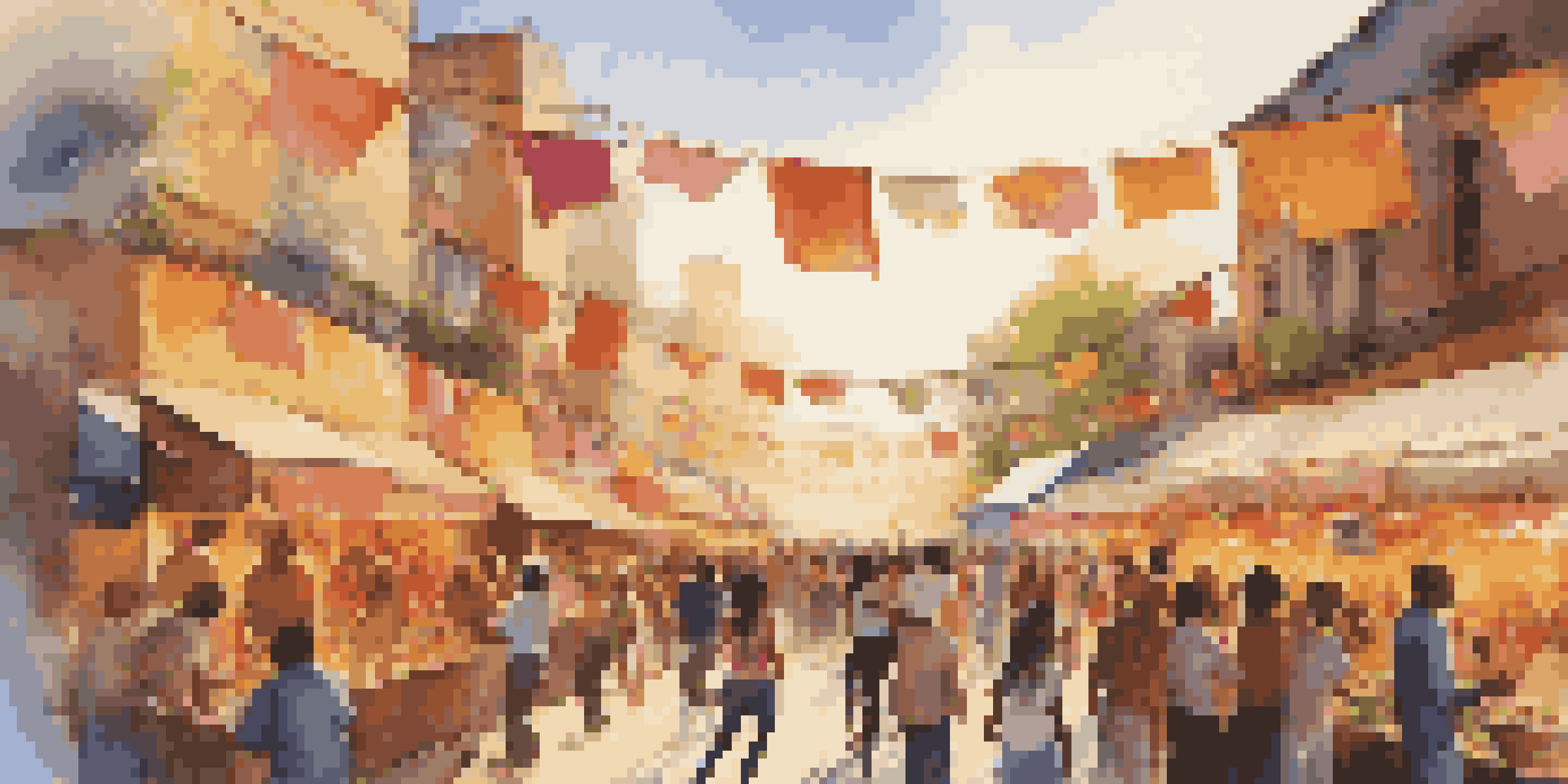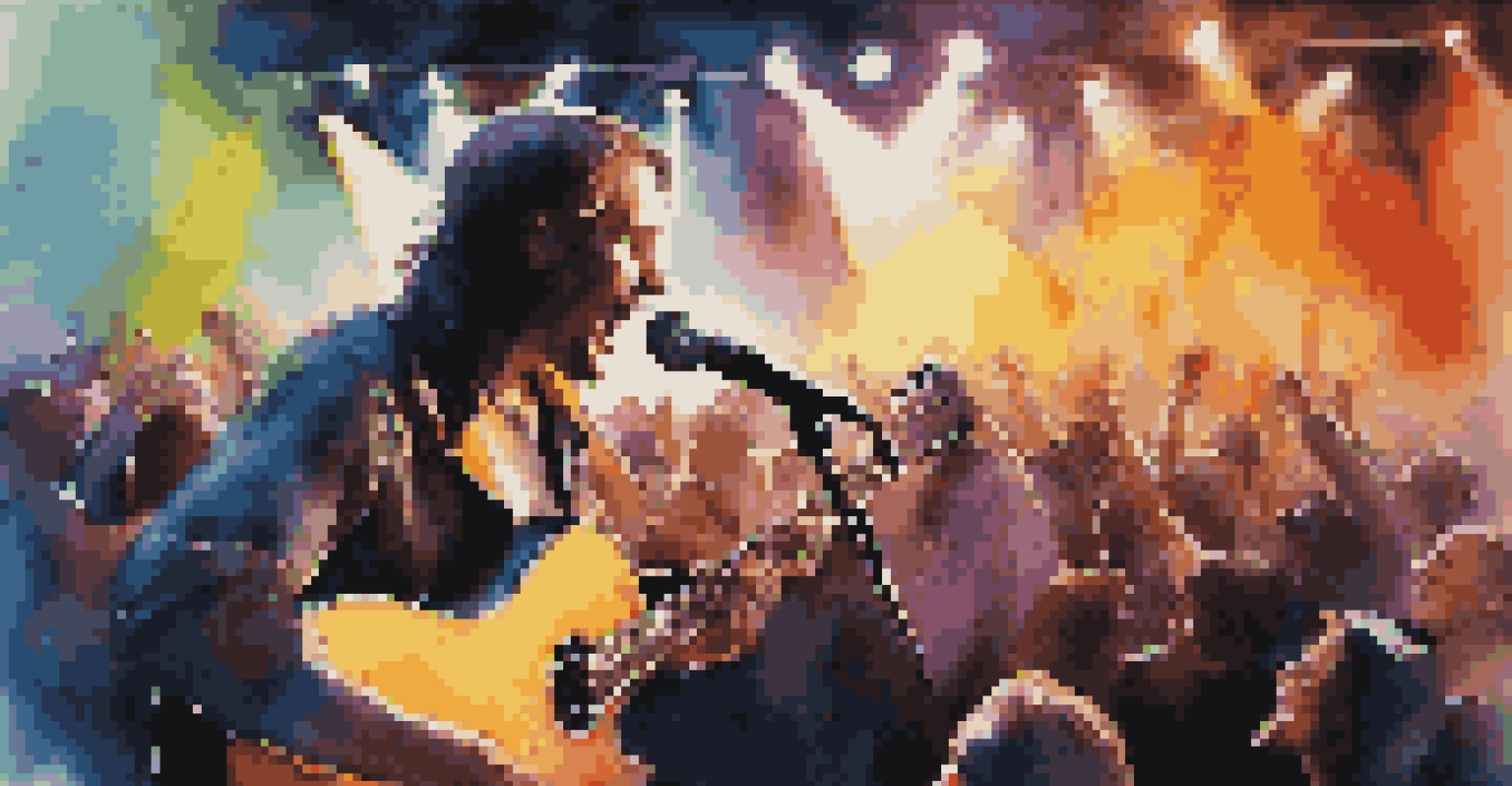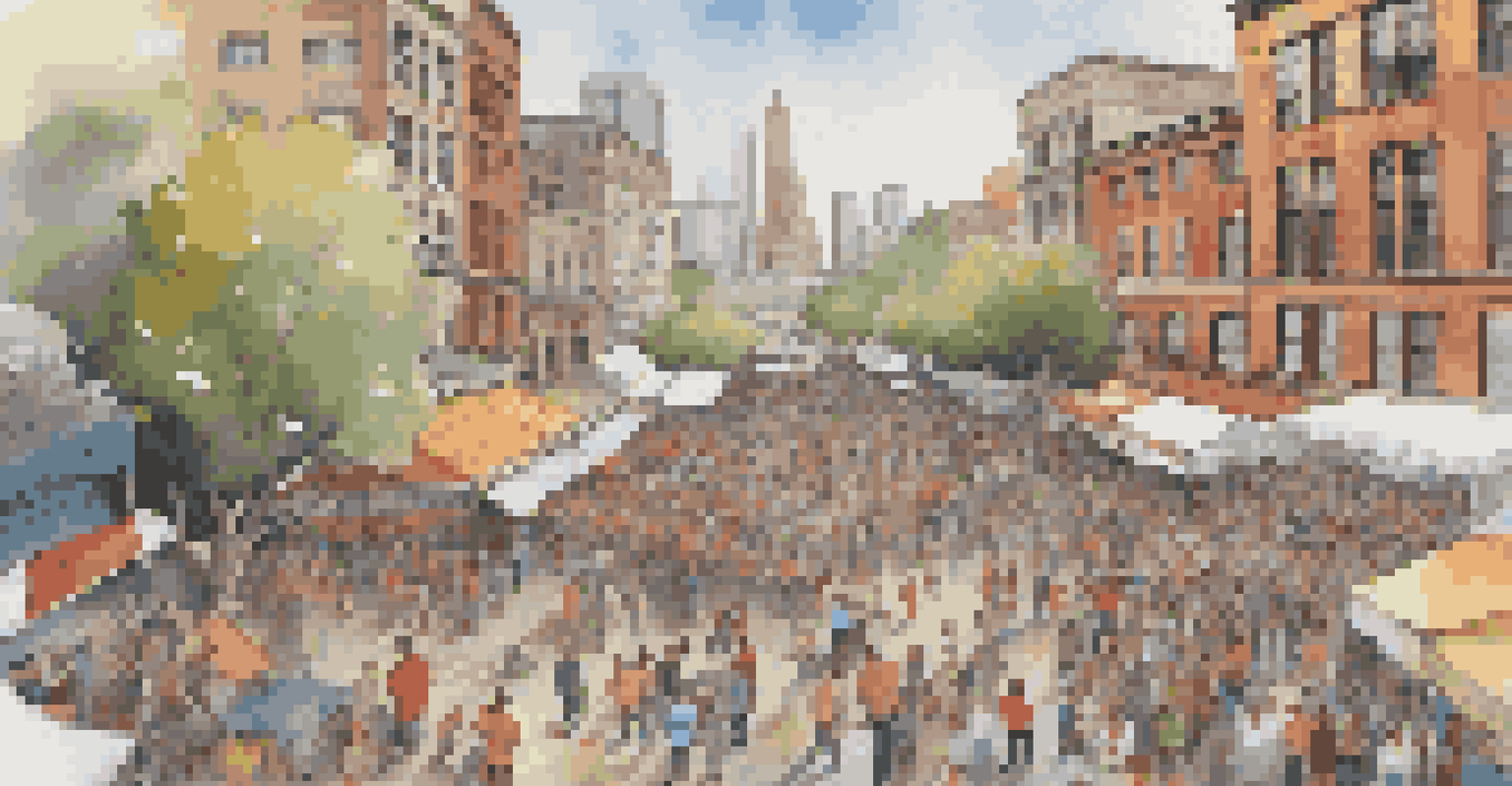The Role of Music in Urban Festivals and Celebrations

Music as the Heartbeat of Urban Festivals
Urban festivals thrive on energy, and music is often their heartbeat. It brings people together, creating a sense of community and belonging. Just think about the last time you attended a festival; the moment the band struck the first chord, the crowd came alive, united in rhythm and melody.
Music can change the world because it can change people.
Different genres of music cater to diverse audiences, allowing festivals to appeal to various tastes. From jazz and blues to hip-hop and electronic, each genre tells its own story and sets a distinct mood. This variety not only entertains but also encourages cultural exchange and appreciation.
At these lively gatherings, music transcends barriers of language and background. It's a universal language that fosters connections, whether through shared dance moves or sing-alongs. In urban festivals, music is more than just background noise; it’s the thread that weaves the fabric of celebration.
Creating an Atmosphere of Joy and Celebration
The right music can transform an ordinary space into a festive atmosphere. Upbeat tunes can uplift spirits, while soothing melodies can create a relaxed vibe. Think of how a simple park can turn into a vibrant celebration with the strumming of a guitar and the laughter of friends.

Festivals often use music to mark significant moments, like the countdown to a fireworks display or the climax of a parade. These musical cues heighten emotions and draw participants into the experience. It’s these moments that linger in our memories, often tied to the sounds that filled the air.
Music Unites Communities at Festivals
Music acts as a universal language, fostering connections and a sense of belonging among festival attendees.
Moreover, music not only sets the scene but also enhances the overall experience. Food stalls, art exhibits, and interactive activities come alive when complemented by the right soundtrack. It’s this synergy that makes urban festivals memorable and enjoyable for everyone involved.
Cultural Expression Through Music
Urban festivals often serve as a platform for cultural expression, with music playing a central role. Local artists and musicians showcase their talents, celebrating their heritage and storytelling. This not only enriches the festival experience but also educates attendees about different cultural backgrounds.
Without music, life would be a mistake.
For example, consider how a Latin festival might feature salsa dancing and mariachi bands, offering a taste of the culture through music. Such performances foster appreciation and understanding, breaking down cultural barriers and promoting inclusivity. It’s a beautiful reminder of the diversity that exists within urban communities.
Additionally, music from various cultures can inspire collaborations, leading to unique fusions that reflect the urban landscape. These innovative blends often emerge from festivals, showcasing how music evolves and adapts, much like the cities themselves. It’s a dynamic dance of tradition and modernity that keeps the festival scene vibrant.
The Economic Impact of Music at Festivals
Music is more than just an entertainment choice; it significantly impacts the economy of urban festivals. When popular artists perform, they draw large crowds, which benefits local businesses, from food vendors to hotels. This economic boost is crucial for cities looking to enhance their cultural offerings and attract tourism.
Moreover, festivals often create job opportunities for musicians, sound technicians, and event organizers. These jobs not only support local talent but also contribute to the economic fabric of the community. The ripple effect of a successful music festival can be felt long after the last note fades.
Cultural Expression Through Music
Urban festivals serve as platforms for local artists to celebrate their heritage, promoting cultural appreciation and inclusivity.
Investing in music at urban festivals can lead to greater long-term benefits, like increased tourism and community engagement. Cities that prioritize music in their festivals often see a return on investment through both immediate revenue and lasting cultural significance. It’s a win-win situation for everyone involved.
Fostering Community Engagement Through Music
Urban festivals are a fantastic way to foster community engagement, and music is at the forefront of this initiative. Local musicians often take center stage, encouraging residents to showcase their talents and connect with one another. This sense of involvement strengthens community bonds and cultivates a shared sense of pride.
Many festivals also host workshops or open-mic events, inviting community members to participate actively. These opportunities not only highlight local talent but also empower individuals to express themselves creatively. When people come together to create and share music, it reinforces a sense of belonging and unity.
Furthermore, music can be a powerful tool for advocacy and social change within communities. Festivals often feature artists who address social issues through their lyrics, sparking conversations and encouraging action among attendees. This blend of entertainment and activism creates a vibrant space for community dialogue and growth.
Music as a Tool for Marketing and Promotion
In today’s digital age, music plays a vital role in marketing urban festivals. Catchy jingles or popular songs can create memorable branding that resonates with potential attendees. Think about how a well-crafted festival anthem can become synonymous with the event, enhancing its visibility and appeal.
Social media platforms leverage music to amplify promotional efforts, with videos and posts featuring irresistible soundtracks. This not only captures attention but also invites sharing, expanding the festival's reach to a broader audience. Music becomes a strategic asset in attracting diverse crowds and boosting ticket sales.
Economic Boost from Music Festivals
Successful music festivals significantly benefit local economies by attracting crowds and creating job opportunities.
Moreover, partnerships with local artists can enhance a festival's brand identity. Collaborating with musicians for promotional materials or exclusive performances creates a unique experience that sets the festival apart. It’s a symbiotic relationship where both the festival and the artists benefit, creating a buzz that drives attendance.
The Future of Music in Urban Festivals
As we look to the future, the role of music in urban festivals will undoubtedly continue to evolve. Innovations in technology, such as virtual reality and live-streaming, are already changing how audiences experience music. Imagine attending a festival from the comfort of your home while still feeling the energy of the crowd.
Additionally, the rise of sustainability in event planning means that music festivals will increasingly prioritize eco-friendly practices. This could lead to more local artists being featured, reducing carbon footprints associated with travel. Festivals might become showcases for not just musical talent but also environmental stewardship.

Ultimately, the future of music in urban festivals lies in its ability to adapt and resonate with audiences. As cities grow and change, the soundscape of festivals will reflect these transformations, continually inspiring and uniting communities. It's an exciting time for music lovers and festival-goers alike.